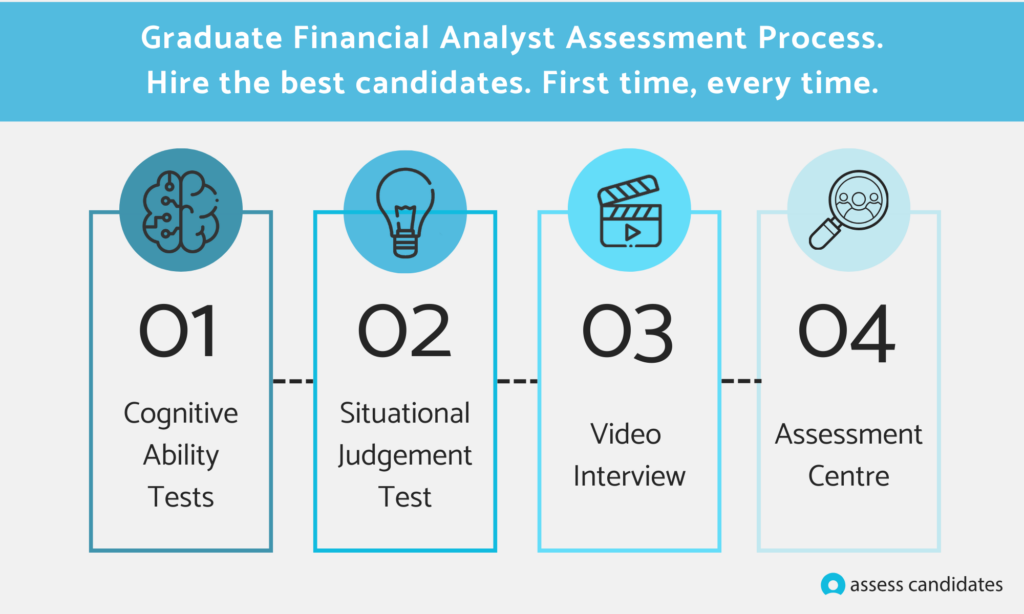Hiring for Graduate Financial Analysts: Why this pre-employment assessment process should be adopted
As a professional in talent acquisition, it can be difficult ensuring your recruitment assessment processes stay innovative and relevant to each specific role and field. In this short piece, we outline best practice for hiring a Graduate Financial Analyst and recommend a reliable assessment process tailored to this role’s demands.
Contents:
- What is a Graduate Financial Analyst and what do they do?
- What is the best assessment process to hire the right Graduate Financial Analyst?
- Concluding remarks
1. What is a Graduate Financial Analyst and what do they do?
What is a Graduate Financial Analyst?
A Graduate Financial Analyst is an entry-level role, often recruited as part of a structured graduate scheme to expose recent graduates to various aspects of the financial industry and broaden their skills and knowledge base.
What are the roles and responsibilities of a Graduate Financial Analyst?
Graduate Financial Analysts are expected to assist in accurately evaluating and planning for the financial health of the company through monitoring and analyzing financial data.
Common responsibilities include:
- Financial research and reporting;
- Forecasting, budgeting, and cost analysis;
- Financial modeling and harnessing of digital technologies to innovatively improve financial processes and reduce company costs;
- Measuring financial risk associated with investment decisions;
- Presenting insights and reports to senior management or clients;
- Collaboration with the Finance and IT teams.
What skills are needed for a Graduate Financial Analyst?
There are numerous cognitive and soft skills which are required to be a successful Graduate Financial Analyst. These are:
- Analytical skills;
- Problem-solving skills;
- Numerical aptitude;
- Accounting skills;
- Critical thinking skills;
- Communication skills;
- Presentation skills;
- Financial and technical knowledge.
These core skills should, therefore, be carefully assessed during any recruitment process for a Graduate Financial Analyst.
Create a hiring assessment process for your Graduate Financial Analyst role. Hire For Free
2. What is the best assessment process to hire the right Graduate Financial Analyst?
When hiring for a Graduate Financial Analyst role, as recruiters it can be difficult to determine which candidates possess the required skills and competencies solely through CVs and Cover Letters. That is why a systematic and robust hiring assessment process is key.

1. A Pre-employment Numerical Reasoning Test
As Graduate Financial Analysts will work heavily with numbers, graphs, and financial reports, it is essential to assess candidates’ numerical skills and aptitude at the initial sifting stage of assessment.
A pre-employment numerical reasoning assessment will quickly and accurately show which candidates possess the desired numerical ability for the role and help you select those who should pass to the next stage of hiring assessments.
2. Pre-employment Verbal and Logical Reasoning Tests
At this initial sifting stage, it is best practice to combine the numerical assessment with other aptitude tests for recruitment.
Graduate Financial Analysts in the workplace will be required to present their findings to senior management and/or clients and work closely together with other members of the Finance team. Therefore, a pre-employment verbal reasoning assessment is key to test candidates’ interpersonal and communication skills.
Graduate Financial Analysts may also be required to make complex fast decisions, highlighting the need for a pre-employment logical reasoning test to assess candidates’ critical thinking and problem-solving skills.
Did you know that combining aptitude tests together at the initial stage of assessment can reduce your candidate pool by 50%. This is particularly beneficial in graduate scheme recruitment to speed up sifting through the high volume of applications.
3. A Pre-employment Situational Judgement Test
At the next stage of assessment, we recommend presenting candidates with work-based scenarios in the form of a pre-employment situational judgement test. This assessment will provide well-rounded insight into candidates’ behavioral competencies and core strengths, complimenting the insight already gained in the previous stage about their technical skills.
What’s more, the situational judgement test can be customized to reflect work-based scenarios and challenges commonly faced in financial roles or within your specific organization. It can also be tailored to assess the specific competencies required for Graduate Financial Analyst roles such as:
- Planning;
- Decision-making;
- Problem-solving;
- Communication;
- Accounting competency and knowledge.
The situational judgement test is a flexible and versatile assessment that can accurately predict candidates’ job performance and suitability for the Graduate Financial Analyst role.
4. A Pre-hire Video Interview
We suggest next asking candidates to take a timed video interview so that you, as recruiters, can learn more in-depth about them, their competencies, and experience.
For the Graduate Financial Analyst role, this video interview could be designed as situational and behavioral competency-based or instead to cover and assess more technical topics such as the candidate’s accounting skills and/or financial and technical knowledge.
For example, video interview questions could range from ‘Tell me about a time when you faced a tight deadline?’ or ‘Define and explain the three financial statements.’
5. An Assessment Center
To end your recruitment assessment process for the Graduate Financial Analyst role, it is common to invite final candidates to an assessment center, virtual or in-person. As assessors, you may observe how candidates work in group exercises, how they present financial presentations, and what their strengths and weaknesses are. This will help you make informed decisions when selecting top candidates to hire who are also the best fit for the role and your company culture and values.
3. Concluding remarks
By incorporating these 4 different assessment types into your hiring process for a Graduate Financial Analyst, you will gain a comprehensive well-rounded view of candidates’ technical abilities, core competencies, and overall fit for the organization whilst ensuring your recruitment plan remains relevant and specific to the Graduate Financial Analyst role.
Interested in getting the latest insights and advice on candidate assessment? Sign up with your email below to get started.
